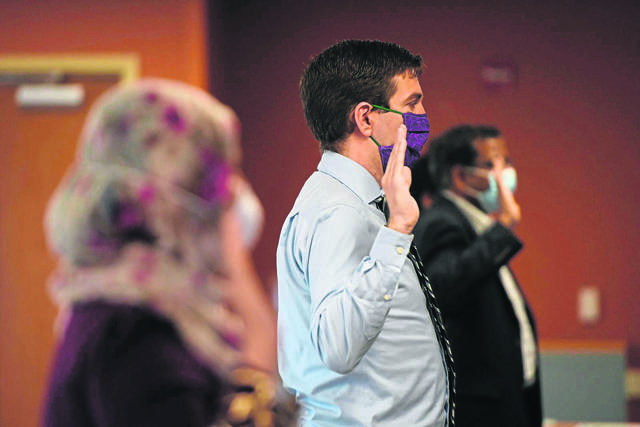https://naviga.triblive.com/local/pittsburgh-allegheny/wilkins-township-immigration-office-employees-face-furloughs/
Wilkins Township immigration office employees face furloughs

Up to 25 people working in the United States Citizenship and Immigration Services (USCIS) field office in Wilkins could be furloughed if the federal agency does not receive congressional funding, a union representative said.
Tom Vacca has worked at the USCIS field office for 16 years. He is a steward for the local chapter of the American Federal Government Employees union, which represents the employees at the Pittsburgh field office. He said Congress needs to approve emergency funding to keep the agency afloat through the covid-19 pandemic.
A USCIS spokeswoman, who spoke on behalf of the agency but was not authorized to be quoted, said the agency plans to furlough 13,400 employees beginning Aug. 3 if a proposal for emergency funding — $1.2 billion — is not granted. She declined to provide information specific to the Pittsburgh office.
The federal agency’s website states its workforce is around 19,000.
“The union believes that the furlough of employees … will greatly contribute to the unemployment numbers,” Vacca said. “But it will also cause a national shutdown of immigration services. Can’t do business without employees, can’t generate revenue if you’re not doing business. No one wants to lose their job, but this is going to affect much more than the employees in our office.”
The Pittsburgh field office, which services the western half of Pennsylvania and all of West Virginia, typically processes about 100 applicants in the process of becoming naturalized citizens every month. The office also helps immigrants obtain permanent and work visas.
Michael Horvath, the Pittsburgh field office director, declined to comment.
Joseph Murphy, a Pittsburgh immigration attorney, said news of the possible furloughs is a source of anxiety for his clients.
“They’re terrified about what’s going to happen,” he said.
Murphy’s office represents about 100 clients in the region, many of whom are applying for work visas, he said.
If the Pittsburgh field office shuts down, “immigration services such as asylum and citizenship/naturalization applications, green cards (permanent residency), refugee applications, work visas and other critical services will not be processed,” Vacca said in an email.
USCIS is funded by the fees associated with applying for visas and citizenship, he said. The agency suspended routine in-person services in March in response to the coronavirus pandemic, negatively impacting the agency’s budget.
The field office naturalized four people in May as U.S. citizens. Recently, the office began interviewing candidates for naturalization on a limited basis, but Vacca said the interviews represent “small numbers compared from what we normally do.”
The field office typically hosts several naturalization ceremonies every month, with each drawing around 50 people, he said.
The USCIS spokeswoman said the agency expects a 61% decrease in application and petition receipts through the end of summer because of covid-19. She said the agency on May 15 proposed a $1.2 billion injection to maintain operations. The proposal requires USCIS to add a 10% surcharge to its application fees to reimburse taxpayers.
The agency is legally obligated to give employees at minimum a 30-day notice of a furlough, according to the spokeswoman. If funding is not granted, those 13,400 notices would be issued by July 2, advising that a furlough would begin Aug. 3.
“We need the support from Congress and the president to do the right thing,” Vacca said.
A spokesman for the House Committee on Appropriations said the White House had not submitted a request for emergency funding as of Monday.
President Trump, did, however, extend an immigration ban through Dec. 31. In an executive order signed Monday, the Trump administration banned four non-immigrant work visa programs because they pose “a significant threat to employment opportunities for Americans affected by the extraordinary economic disruptions by the covid-19 outbreak,” the proclamation states.
The order, first implemented in April, blocks visas for a variety of jobs and restricts companies from transferring foreign employees to U.S. branches.
“(Trump is) protecting the labor market. But they’re going to have to find the money or else (the immigration system) is going to completely collapse,” said Murphy, the immigration attorney. “And if they’re going to cut these work visa programs down, there’s even more money that definitely won’t come in to USCIS.”
Copyright ©2026— Trib Total Media, LLC (TribLIVE.com)
